- Austausch & Vernetzung
- Wissen & Lernen
- Advocacy
- Unsere Themen
Angesichts des Krieges in Nahost schreiben Vorstand und Geschäftsstelle von Medicus Mundi Schweiz gemeinsam ein Editorial. Sie unterstreichen, dass Gesundheitseinrichtungen und das Gesundheitspersonal nie Teil einer Kriegsstrategie sein dürfen. Sie wenden sich gegen Hass, Gewalt und den hierzulande wiederauftauchenden Antisemitismus.
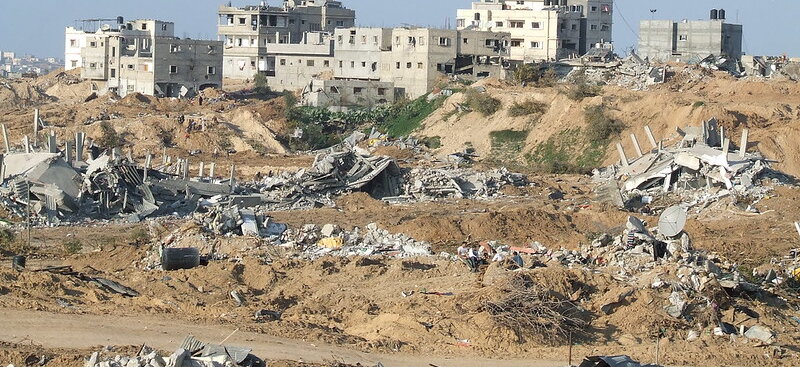
Wir schreiben dieses Editorial im Wissen, dass unsere Worte nur beschränkt ausdrücken können, was es zu sagen gibt. Wir schreiben dies im Wissen, dass wir als Netzwerk, das sich für das Recht auf Gesundheit für alle engagiert, nicht schweigen dürfen.
Am Anfang dieser Phase des langjährigen Konfliktes steht ein mörderischer Plan der Hamas: Der brutale, pogromartige Angriff der Hamas auf die Bevölkerung und Menschen in Israel und die Geiselnahme unzähliger Zivilpersonen hat dazu geführt, wo wir heute stehen. Nichts kann und darf diesen Terror der Hamas aus unserem Bewusstsein wischen.
Vorstand und Geschäftsstelle sind zutiefst besorgt, dass in diesem Krieg, wie überhaupt vermehrt in bewaffneten Konflikten, Gesundheitseinrichtungen zu Zielen militärischer Angriffe werden. Diesen sich wiederholenden Verstoss gegen das humanitäre Völkerrecht darf die internationale Gemeinschaft nicht einfach hinnehmen. Dazu gehört auch die Gewalt gegen das Gesundheitspersonal – gegen diejenigen Menschen also, welche auch in fragilen Kontexten sicherstellen, dass Menschlichkeit nicht untergeht und Wege hin zu einem gewaltfreien Zusammenleben nicht versperrt werden.
Gesundheitseinrichtungen dürfen niemals Teil der Kriegsstrategie sein – auch nicht als Teil der Kriegsvorbereitungen. Dies ist der Fall, wenn sie für Kommandoeinrichtungen oder als Waffenlager missbraucht werden. Damit hintertreiben kriegsführende Mächte das Vertrauen in die Gesundheitseinrichtung als Ort, an welchem alle die notwendige medizinische Versorgung erhalten – und sie gefährden Patient:innen akut, falls sich ein Konflikt zu einem Krieg entwickelt.
Angesichts der medialen Logik, unter welchem auch der Krieg in Nahost steht, erinnern Geschäftsstelle und Vorstand daran, dass es neben diesem Krieg, weitere Kriege und Konflikte gibt, in welchen das Recht auf Gesundheit und der Zugang zu sicheren Gesundheitsdienstleistungen der Zivilbevölkerung versagt bleiben. Menschenrechte sind universell und unteilbar – daran müssen wir festhalten.
Vorstand und Geschäftsstelle stehen solidarisch auf der Seite der Opfer dieser Kriege – und wir stehen solidarisch auf der Seite des Gesundheitspersonals, welches sich weltweit unter schwierigsten Bedingungen für das Recht auf Gesundheit engagiert. Wir wenden uns gegen Hass und Gewalt, gegen Ungleichheit, Ausgrenzung und Diskriminierung. Und wir wenden uns insbesondere auch gegen Rassismus, Islamophobie und Antisemitismus hier in der Schweiz.
Vorstand und Geschäftsstelle des Netzwerks Medicus Mundi Schweiz

"Gemeinsam mit Intersos, Médecins du Monde, Médecins Sans Frontières und Terre des hommes Lausanne mobilisieren wir heute Abend beim Broken Chair auf der Place des Nations in Genf und unterstützen den Aufruf für einen sofortigen Waffenstillstand, #CeasefireNow, um eine Verschlimmerung der humanitären Katastrophe zu verhindern. (...) Hunderte von zivilgesellschaftlichen Organisationen, darunter humanitäre Hilfsorganisationen in den besetzten palästinensischen Gebieten und Menschenrechtsgruppen aus der ganzen Welt, fordern einen sofortigen Waffenstillstand in Gaza und Israel als einzige realistische und wirksame Möglichkeit, das schreckliche Leid zu lindern und Menschenleben zu retten."
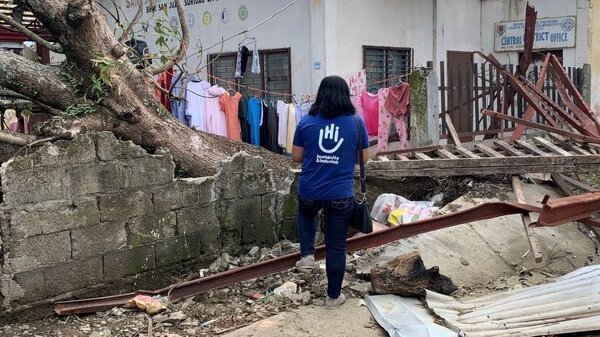
"Am 30. November beginnt in Dubai die COP 28. Dies ist ein wichtiger Moment, in dem wir im Namen der vom Klimawandel am stärksten betroffenen Gemeinschaften und Einzelpersonen, insbesondere Menschen mit Behinderungen, starke Botschaften überbringen werden. (...) Wir freuen uns, dass soziale Inklusion eines der vier Querschnittsthemen der diesjährigen Konferenz ist und die Mitgliedsstaaten dazu verpflichtet, dringend gerechte und inklusive Massnahmen gegen den Klimawandel zu ergreifen."
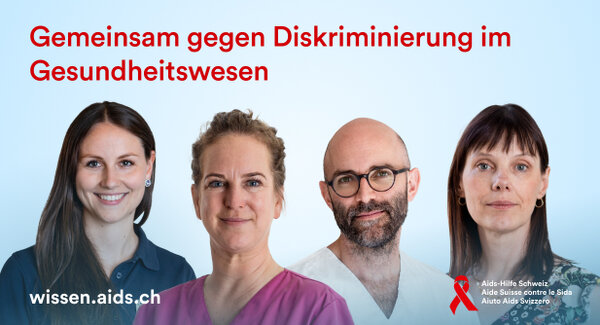
Medienmitteilung
"Die Aids-Hilfe Schweiz führt die eidgenössische Meldestelle für Diskriminierungen und Datenschutzverletzungen gegenüber Menschen mit HIV. Der neuste Bericht verzeichnet im laufenden Jahr 98 Fälle von Diskriminierungen, wobei von einer sehr hohen Dunkelziffer ausgegangen werden muss. Besonders beunruhigend ist die anhaltende Diskriminierung im Gesundheitswesen. Der diesjährige Bericht dokumentiert Fälle, in denen Menschen mit HIV der Zugang zu medizinischen Leistungen verwehrt wurde. Um dieser besorgniserregenden Entwicklung entgegenzuwirken, startet die Aids-Hilfe Schweiz eine Kampagne, die sich an das Gesundheits- und Sozialsystem richtet. Das Ziel ist, Wissen zu vermitteln, Vorurteile abzubauen und eine diskriminierungsfreie Behandlung von Menschen mit HIV zu fördern. Denn heute kann HIV so effektiv behandelt werden, dass keine Virenlast mehr nachweisbar ist, wodurch eine Übertragung im Alltag oder im Rahmen medizinischer Behandlungen ausgeschlossen ist. Es ist höchste Zeit, dass diese Erkenntnis in der gesamten Gesundheitsbranche ankommt. In Kooperation mit wichtigen Berufsorganisationen aus dem Gesundheitswesen wie dem Verband Schweizerischer Assistenz- und Oberärztinnen und -ärzte (VSAO), der Schweizerischen Zahnärzte-Gesellschaft (SSO) oder dem Schweizer Berufsverband der Pflegefachpersonen (SBK) verbreitet die Aids-Hilfe Schweiz deshalb die Botschaft: Begegnen Sie Menschen mit HIV entspannt. Gerade im Gesundheitswesen."
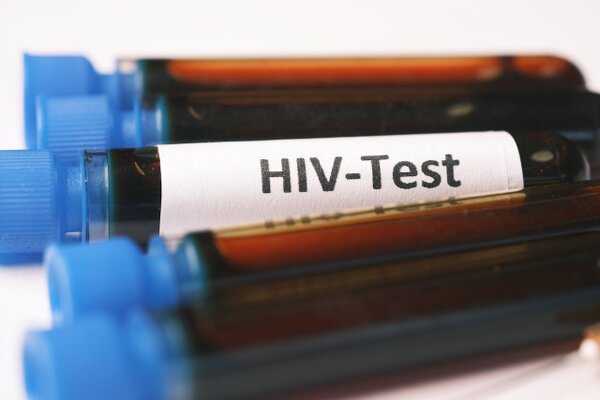
Medienmitteilung
"Das Bundesamt für Gesundheit (BAG) vermeldet steigende Infektionszahlen aller meldepflichtigen sexuell übertragbaren Infektionen (STI). Angesichts dieser Entwicklung ist regelmässiges, asymptomatisches Testen bei besonders betroffenen Gruppen wichtiger denn je. Die Stärkung schlüsselgruppen-spezifischer Präventionsarbeit und Gesundheitszentren ist dafür eine zentrale Voraussetzung. Im Jahr 2022 wurden dem Bundesamt für Gesundheit (BAG) insgesamt 371 neue HIV-Infektionen gemeldet (vgl. BAG-Jahresbericht). Das sind deutlich mehr Meldungen als im Vorjahr (325 Fälle, +14% zu Vorjahr), was teilweise mit einem Rückgang der HIV-Tests und Verhaltensänderungen während der Covid-Pandemie erklärt werden dürfte. Auch bei den sexuell übertragbaren Infektionen Chlamydien (13'063, +6%), Gonorrhö (5'112, +25%) und Syphilis (1'078, +20%) steigen die Zahlen erheblich."
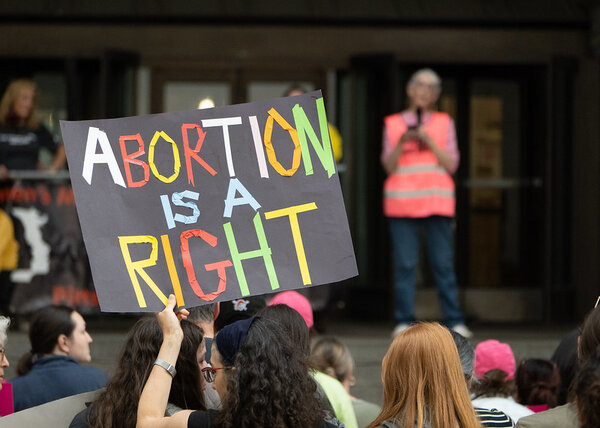
Medienmitteilung
"Menschen, die den Zugang zu sicheren Schwangerschaftsabbrüchen verteidigen und wichtige Dienstleistungen erbringen, werden in vielen Ländern stigmatisiert, eingeschüchtert, angegriffen und ungerechtfertigt verfolgt. Dies macht ihre Arbeit immer schwieriger und gefährlicher, wie Amnesty International in einem neuen Bericht feststellt."
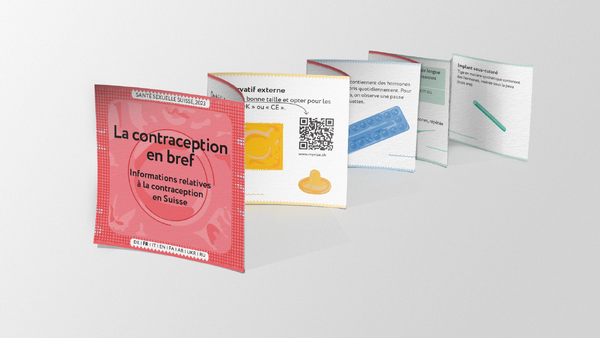
Leporello zum Thema Schwangerschaftsverhütung
«Rund um Verhütung» heisst das neue Leporello, welches kurz und prägnant Auskunft gibt zu unterschiedlichen Schwangerschaftsverhütungsmethoden und Notfallverhütung in der Schweiz. Die Broschüre ist eine Neuauflage von «Können wir darüber reden?» und ist neu neben Deutsch, Italienisch und Französisch auch auf Russisch und Ukrainisch erhältlich. Die Übersetzungen auf Farsi und Arabisch folgen bis Ende des Jahres."

"Sex and Facts, vormals sex-i, ist ein einzigartiges Tool zur Unterstützung der Fachpersonen bei Beratungen im Bereich der sexuellen Gesundheit, insbesondere bei Menschen in vulnerablen Situationen mit Migrationserfahrung und wenig Kenntnissen in den Schweizer Landessprachen. Seit dem 2. November erscheint die Website sex-i.ch im neuen Look und heisst nun Sex and Facts. Auch die Promokarten erscheinen neu im Format einer Visitenkarte, sind mit einem QR-Code versehen und im SGCH-Shop kostenlos erhältlich. Sie sind für die Abgabe an Personen in der Beratung vorgesehen, damit diese einen leichten Zugang zu den Informationen erhalten."
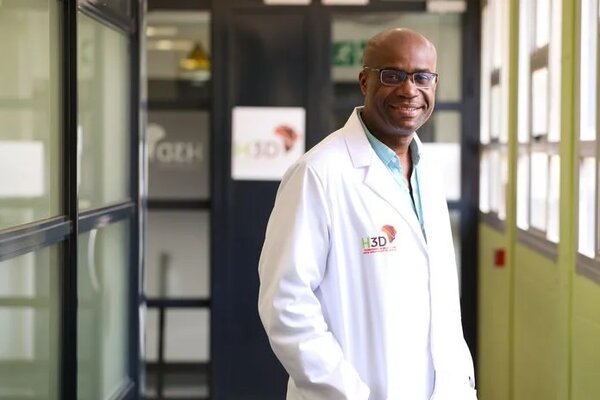
"Kelly Chibale was – to say the least – not born into science. Yet, he has become one of the most influential researchers in the field of drug discovery and development globally. Born in a rural part of Zambia, Kelly’s childhood was a struggle for bare survival. There was no running water, let alone television to provide entertainment. Instead, dusty roads, poverty and violence. “Education, which was free at the time, was the only way out of poverty for me,” Kelly Chibale recalls. Secondary school awakened in him a talent and fascination for chemistry. Mixing liquids to make them appear in new colours turned out to be a real miracle."
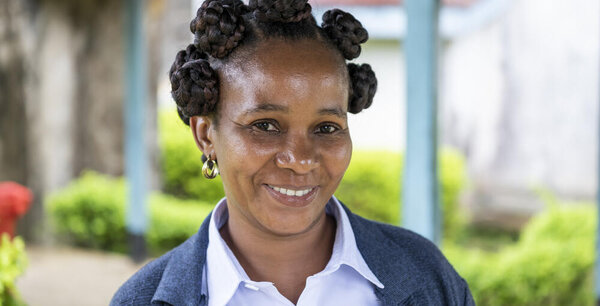
»Das Schlimmste ist, wenn man weiss, was zu tun wäre, aber die Ausrüstung dazu nicht hat. Das ist traurig und frustrierend.«
"In Tansania sterben jährlich rund 45’000 Neugeborene aufgrund unzureichender medizinischer Versorgung. In einem dreijährigen Projekt verbessert SolidarMed die Überlebenschancen von Frühgeborenen und untergewichtigen Neugeborenen in der ländlichen Region Morogoro und setzt dabei auf eine bewährte Methode. (...) Dank SolidarMed hat sich die Situation am Mahenge-Spital bereits stark verbessert: Das Distriktspital ist eines von drei Spitälern in der ländlichen Region Morogoro, deren Abteilungen für Neugeborene mit der Unterstützung von SolidarMed ausgebaut werden."
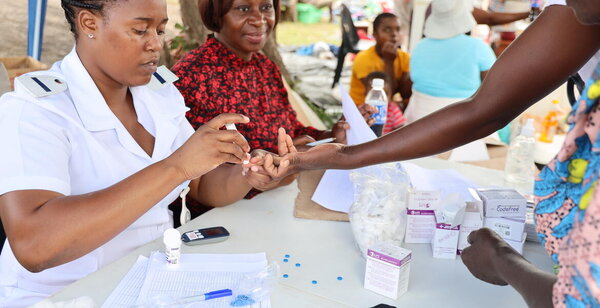
"Diabetes ist eine der häufigsten nicht-übertragbaren Krankheiten weltweit. In Simbabwe und Lesotho arbeitet SolidarMed mit der Stiftung «World Diabetes Foundation» zusammen, um Menschen in ländlichen Regionen Zugang zu Prävention, Diagnose und Behandlung der Krankheit zu verschaffen. Die Blutzuckerkrankheit Diabetes führt jedes Jahr zu rund zwei Millionen Todesfällen, die meisten davon in Ländern mit niedrigem bis mittlerem Einkommen. Gerade in ländlichen Regionen des südlichen Afrikas sind Spitäler und Gesundheitszentren bisher kaum auf die Behandlung solcher nicht-übertragbaren Krankheiten ausgerichtet – es fehlt weitgehend an medizinischer Versorgung und Prävention."
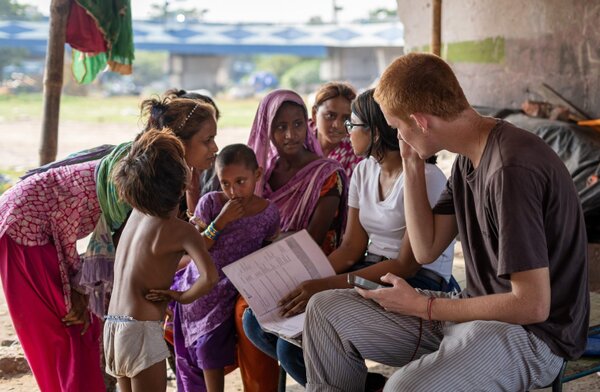
"Geplant von der Calcutta Rescue Research Collaborative (CRRC) – einer Partnerschaft zwischen hauptamtlichen und freiwilligen Forschern und Medizinern auf der ganzen Welt – werden in den nächsten fünf Monaten 12’000 Stunden Interviews mit rund 1’200 Befragten in 25 Slums durchgeführt. Wie hat die erste MPI (multidimensionale Armut) Studie CR geholfen? Die erste MPI-Erhebung von CR im Jahr 2019 hat CR in vielerlei Hinsicht geholfen. Sie zeigte grosse Unterschiede im Ausmass der Entbehrungen und der Armut von Slum zu Slum. Die genauen Probleme in den einzelnen Slums wurden damit genauer ermittelt."
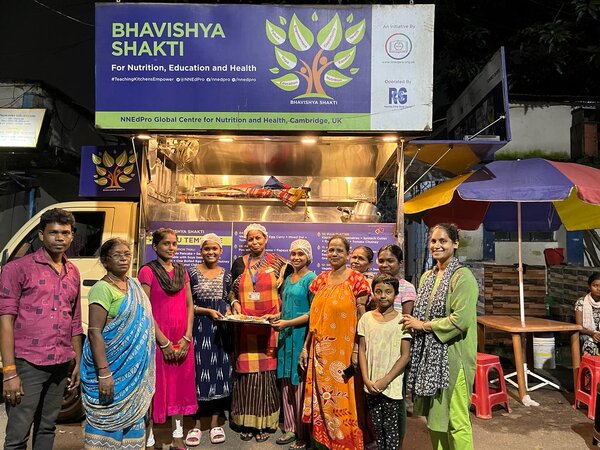
„Die Fahrzeugküche kam in unser Viertel, und die Köchin Didi, wie wir sie liebevoll nennen, zeigte uns nicht nur, wie man gesundes Essen kocht, sondern wir durften es auch selbst ausprobieren. Auf diese Weise können wir lernen, wie man es richtig macht und unsere Familien ernährt“, sagte Puja, die im Dilerjung-Slum lebt, wo Calcutta Rescue (CR) Strassenmedizin, Gesundheitsaufklärung und Bildung anbietet. Puja ist nur eine von vielen jungen Frauen und Müttern, die dank einer einzigartigen Partnerschaft zwischen CR und zwei bahnbrechenden Organisationen lernen, wie man köstliche und gesunde Mahlzeiten aus erschwinglichen Zutaten zubereitet."
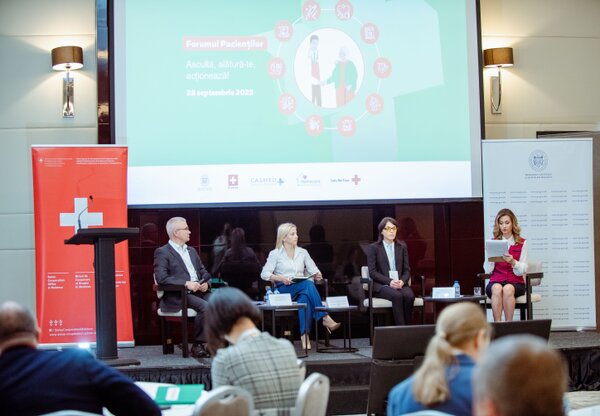
Patient involvement can improve the quality of health service
"The first ever Patient Forum in Moldova took place on September 28 in Chisinau, Moldova. The Patient Forum was organized within the project "Towards health equity through social accountability", implemented by the Swiss Red Cross in partnership with the local NGOs "CASMED" and "HOMECARE", as part of the „Progressing towards Universal Health Coverage in Moldova” support program carried out in jointly with the World Bank, with the financial support of the Swiss Government. Patients can make a significant contribution to monitoring and improving the quality of health services by reporting their experience, expressing their views on the care they have received and identifying potential deficiencies."
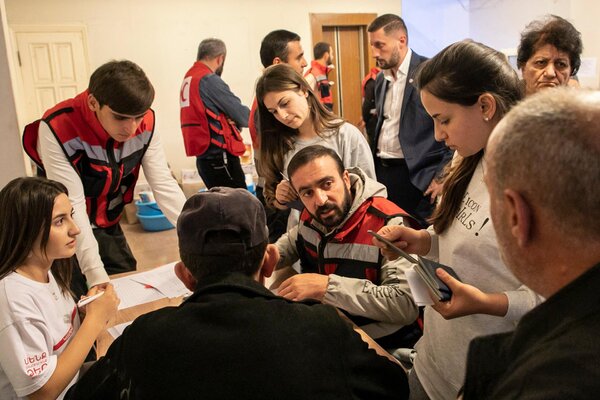
"Nach den Kämpfen in Bergkarabach flüchteten über 100'000 Menschen nach Armenien. Das Armenische Rote Kreuz reagiert rasch auf die Notlage. Das Schweizerische Rote Kreuz unterstützt sie dabei – mit langjähriger Vorbereitung auf solche Krisen und Bargeld-Hilfe für die vertriebenen Menschen."
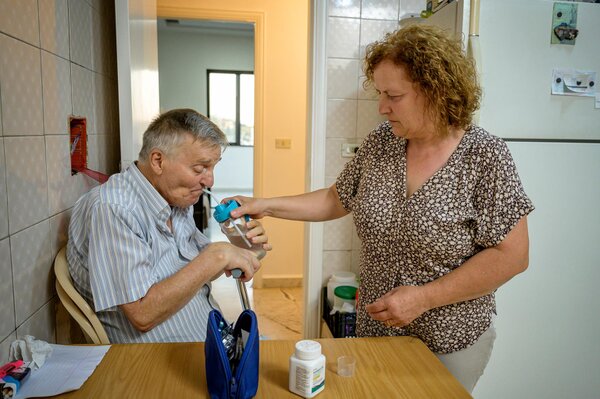
"Sanaa Youssef Mousallem gehörte zur libanesischen Mittelklasse, die mit der Krise von 2019 verschwunden ist. Mit dem gesellschaftlichen und wirtschaftlichen Kollaps sind auch die sozialen Auffangnetze zerrissen. Die Mehrheit der Bevölkerung kann sich kaum mehr das Nötigste leisten. Der Andrang auf die Gesundheitszentren des Roten Kreuzes wächst von Tag zu Tag. Eine Folge der schweren Krise, die das Land erschüttert."

Medienmitteilung
"In diesem Jahr ist der Aufruf der Schweizer Bischofskonferenz zur Sammlung der traditionellen Weihnachtskollekte für das Kinderspital Bethlehem besonders aktuell. Die Kollekte kommt dem Kinderspital Bethlehem zugute. Die Solidarität der katholischen Gläubigen aus der Schweiz bedeutet für kranke Kinder in Palästina Hoffnung und Gesundheit. Kinder tragen keine Schuld, und doch leiden sie am meisten unter dem Krieg in Gaza. Auch die kranken Kinder im Westjordanland sind vom Konflikt betroffen, denn ihr Zugang zum Spital in Bethlehem ist stark eingeschränkt. Die Mitarbeitenden des Spitals haben deswegen eine Hotline für telefonische Konsultationen eingerichtet und sorgen dafür, dass chronisch kranke Kinder zu Hause dringend benötigte Medikamente erhalten."
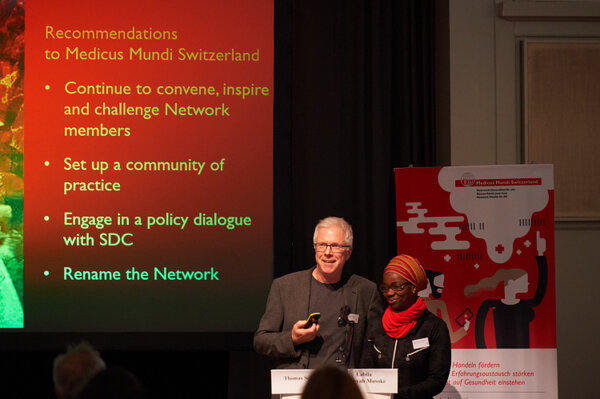
Final report by Labila Sumaya Musoke and Thomas Schwarz (Medicus Mundi International)
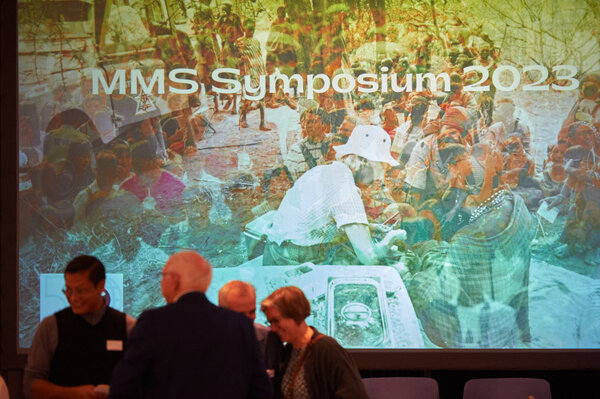
Report: Symposium “50 years Medicus Mundi Switzerland, November 2023" by Natalie Tarr and Martina Staenke
The discussion on decolonization and decolonizing partnerships, work, and how we go about collaborating internationally is a topic the NGO world has put high on its agenda. While the concepts of decolonization and decoloniality still need further reflection, their political demands correspond with a critical assessment and self-assessment of aid as expressed by actors within and outside the aid sector, also in the field of international health cooperation. To mark its 50-year anniversary, Medicus Mundi Switzerland (MMS) organized a one-day symposium to reflect about the work of internationally active NGOs, Civil Society Organizations, and trans-continental partnerships with regard to this call for decolonization. MMS is a network organization of Swiss NGOs and professionals working in international health cooperation. As such, it provides a platform for its members to exchange knowledge, experience, and ideas and to collaborate.
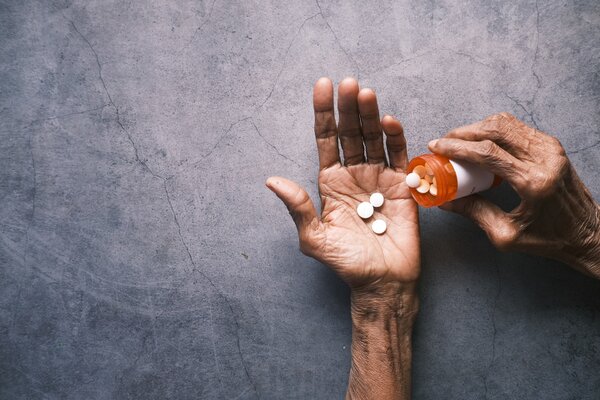
Ein Plädoyer von Expert:innen der Abteilung für Tropen- und humanitäre Medizin (SMTH) und der Abteilung für Onkologie, der Universitätskliniken Genf (HUG).
Der Zugang zu Arzneimitteln spielt eine entscheidende Rolle bei der Verwirklichung der allgemeinen Gesundheitsversorgung (UHC) und ist eines der gesundheitsbezogenen Ziele für nachhaltige Entwicklung. Innerhalb dieses Ziels liegt der Schwerpunkt sowohl auf der Verfügbarkeit als auch auf der Erschwinglichkeit. Betrachtet man die Behandlung verschiedener Krankheiten, so hat die Frage der Verfügbarkeit und Erschwinglichkeit von Arzneimitteln weltweit unterschiedliche Auswirkungen auf Bevölkerungen und Gesundheitssysteme. Die jüngsten Engpässe und steigenden Preise für neue Behandlungsmethoden für bestimmte Krankheiten wie Krebs gefährden selbst in Ländern wie der Schweiz den Zugang zu Medikamenten, obwohl sie vor allem eine Herausforderung für Länder mit niedrigem und mittlerem Einkommen (LMIC) darstellen.
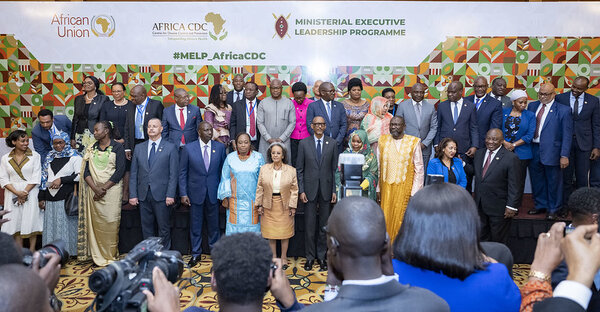
"LUSAKA, Zambia – The silver lining to Africa being denied access to COVID-19 vaccines during the pandemic is how it has galvanised continental leaders to focus on self-reliance – instead of depending on wealthy countries for assistance. The determination to build the continent’s health capacity was abundantly evident at this week’s Conference on Public Health in Africa (CPHIA) hosted by the Africa Centres for Disease Control and Prevention (Africa CDC). “Having a major conference like CPHIA on the continent here in Africa means that we can change the narrative. It means that we can lead the conversation. We can change it by centring what matters most to African communities and spotlighting extraordinary science from African researchers that would normally go unnoticed,” said Shingai Machingaidze, Africa CDC’s acting chief scientist and a rising star in global health."

Der Klimawandel gilt als die größte globale Gesundheitsbedrohung, der sich die Welt im 21. Jahrhundert gegenübersieht
Im aktuellen "Lancet Countdown on Health and Climate Change", der am 14. November 2023 erschienen ist, bewerten Expert:innen von 52 führenden akademischen Einrichtungen und UN-Organisationen, was geschieht, wenn die Erderwärmung nicht aufgehalten und das 1,5-Grad-Ziel, wie 2015 im bahnbrechenden Pariser Klimaabkommen festgelegt, nicht erreicht wird. Der Bericht zeigt, wie sich der Klimawandel zunehmend auf die Gesundheit und das Überleben der Menschen weltweit auswirkt und prognostiziert, dass sich diese Risiken bei weiterer Untätigkeit noch stark verschärfen könnten. So hat sich die von extremer Dürre betroffene Landfläche auf 47 % im Jahr 2013-22 erhöht, was die Wasser- und Ernährungssicherheit vorrangig in afrikanischen Ländern und in Mittel- und Südamerika gefährdet und Millionen von Menschen dem Risiko von Unterernährung und potenziell irreversiblen gesundheitlichen Folgen aussetzt. Auch Infektionskrankheiten werden sich laut des Lancet-Berichtes weiter ausbreiten und auch für Europa eine neue Gefahr bedeuten.

"The inaugural Health Day at COP28 on Sunday saw a strong push by some global leaders, led by US Climate Envoy John Kerry, for a swift transition away from the world’s dependence on fossil fuels. While some countries echoed Kerry’s call for a fossil fuel-free future, others remain hesitant. The high-level Health Day, the first in 27 years of climate conferences, unfolded amidst an uproar over the revelation of remarks by COP President Sultan Al Jaber, who also serves as CEO of the United Arab Emirates national oil company Adnoc. Al Jaber, whose dual role as COP28 President and oil barron is viewed by many observers as a serious conflict of interest, stated in a leaked conference call one week before the summit that there is “no science” behind the claim that phasing out fossil fuels is required to slow global warming, suggesting it could send society “back into caves.”

"The concept of the ‘commercial determinants of health’ (CDOH) has been developed by public health researchers as a way to describe the political economy of corporations and the impact of their practices on health, social inequalities and climate change. In this analysis, we assess the conceptual work that has developed this field and the influence of the more established ‘social determinants of health’ models. We highlight the dominance of epidemiologic and biomedical concepts on understandings of structure and agency in the CDOH literature and argue that the terminology of ‘risk factors’, ‘drivers’ and ‘pathways’ reflects an agent-centred approach. We suggest that, as a result, there is a tendency to overlook the importance of political institutions in shaping the exercise of corporate power."
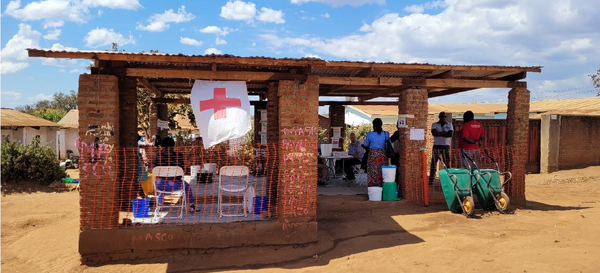
The evaluation concluded that the effectiveness and impact of the PH ERU CCMC deployment were significant, and it probably succeeded in contributing to the early detection and treatment of cholera cases at community level, which potentially had a positive impact on reducing morbidity and mortality.
"Cholera is an acute diarrheal disease that is spread through contaminated food and water. It can cause fast dehydration and lead to death in those severely affected. Preventing dehydration is thus key and around 80% of cases can usually be treated at the community level by providing adequate rehydration with Oral Rehydration Salts, safe water and key health and hygiene promotion messages at Oral Rehydration Points. As part of the strengthening of Public Health (PH) responses through Emergency Response Units (ERUs) within the Red Cross Red Crescent Movement, an ERU focused on the Community Case Management of Cholera (PH ERU CCMC) was developed by the Swiss Red Cross with support from other national societies and the International Federation of Red Cross and Red Crescent Societies."
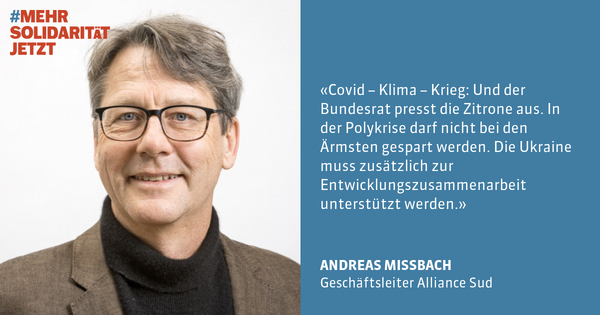
Medienmitteilung
"Der Bundesrat will den Wiederaufbau der Ukraine auf Kosten der ärmsten Länder unterstützen, obwohl zahlreiche Expert:innen, Kantone und Parteien eine zusätzliche Finanzierung verlangen. Eine breite zivilgesellschaftliche Kampagne, die heute lanciert wird, fordert eine Stärkung der Entwicklungszusammenarbeit. Eine Analyse der Vernehmlassungsantworten zur Strategie der internationalen Zusammenarbeit (IZA) 2025-2028 zeigt, dass die vom Bundesrat vorgeschlagene Mittelzuweisung von 1,5 Milliarden Franken für die Ukraine aus dem IZA-Budget keine Unterstützung findet. 93% derjenigen, die sich zur Ukraine-Finanzierung geäussert haben, schreiben explizit, dass die Ukraine-Hilfe aus zusätzlichen Mitteln und ausserhalb der IZA finanziert werden muss."

New WHO campaign highlights tobacco industry tactics to influence public health policies
"The tobacco industry threatens not only public health, it also causes economic strain and next generation addiction. It seeks to sabotage health policies, affects the environment in negative ways, and its dirty money buys influence, promotes misleading narratives, takes advantage of loopholes and pays for tactics to sabotage tobacco control."

Die polnischen Abtreibungsgesetze gehören zu den restriktivsten in Europa. Schwangerschaftsabbrüche sind nur aus zwei Gründen erlaubt: Wenn die Schwangerschaft das Leben oder die Gesundheit der Schwangeren gefährdet und wenn sie das Ergebnis einer Vergewaltigung oder eines Inzests ist. Während der bloße Besitz oder die Selbstverwaltung von abtreibungsfördernden Medikamenten in Polen nicht strafbar ist, wird jede Person oder jeder Arzt, der schwangeren Frauen außerhalb der gesetzlich zulässigen Gründe zu einem Schwangerschaftsabbruch verhilft, mit einer Freiheitsstrafe von bis zu drei Jahren verurteilt. Die Anti-Abtreibungsbewegung wächst, und es besteht die Notwendigkeit, Menschen, die das Recht auf Abtreibung verteidigen und wichtige Dienstleistungen erbringen, besser zu schützen. Sie werden zunehmend stigmatisiert, eingeschüchtert, angegriffen und zu Unrecht verfolgt, was ihre Arbeit erschwert und gefährlich macht.
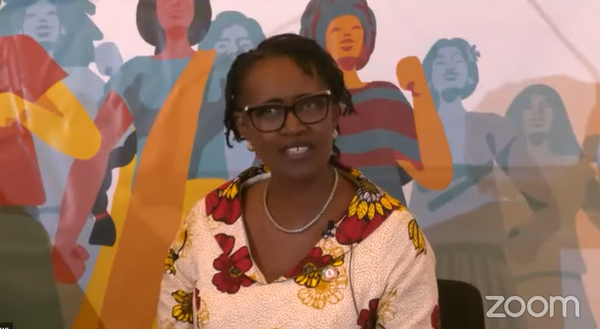
A new report by UNAIDS demonstrates the critical role communities play, and how underfunding and harmful barriers are holding back their lifesaving work and obstructing the end of AIDS.
"As World AIDS Day (1 December) approaches, UNAIDS is urging governments across the world to unleash the power of grassroots communities across the world to lead the fight to end AIDS. A new report launched today by UNAIDS, Let Communities Lead, shows that AIDS can be ended as a public health threat by 2030, but only if communities on the frontlines get the full support they need from governments and donors. “Communities across the world have shown that they are ready, willing and able to lead the way. But they need the barriers obstructing their work to be pulled down, and they need to be properly resourced,” said Winnie Byanyima, Executive Director of UNAIDS. “Too often, communities are treated by decision-makers as problems to be managed, instead of being recognised and supported as leaders. Communities are not in the way, they light the way to the end of AIDS.”
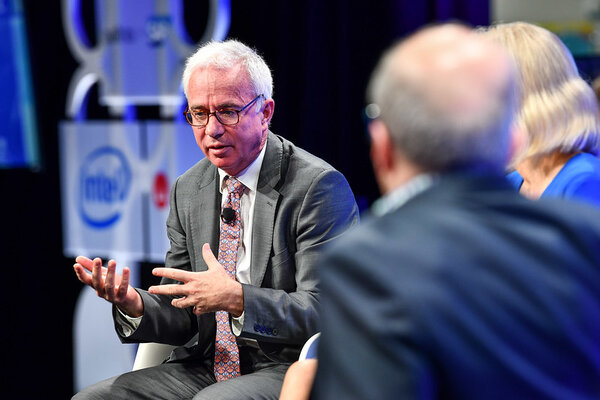
A few days ahead of COP28 – which will address the impact of climate change on health for the first time – Board members noted that climate disasters disproportionately affect low- and middle-income countries with high disease burdens, weak health systems, and fragile political or conflict contexts, putting communities – who have contributed the least to global carbon emissions – at risk.
"The Board of the Global Fund to Fight AIDS, Tuberculosis and Malaria held its 50th meeting this week in Geneva, Switzerland. Two months after the release of the Global Fund’s Results Report, Board members praised the unprecedented progress achieved in the fight against the three diseases in 2022 and the significant investments made to strengthen health systems around the world, including through the reprogramming of funds from the Global Fund’s COVID-19 pandemic response. However, they expressed concern that the growing challenges of climate change, conflict, and the erosion of human rights undermine the partnership’s ability to end the three diseases by 2030."

"A new set of HIV Prevention & Accountability reports developed by Frontline AIDS and community partners in India and nine countries in Africa show that while governments have made important progress in reducing the number of people newly acquiring HIV, most are still not investing enough in HIV prevention. Many governments are still reluctant to make much-needed changes to remove barriers to prevention methods and treatment for those most affected by HIV, including men who sex with men, transgender people, sex workers, people who use drugs and adolescent girls and young women."

"Developed under the You(th)Care programme, this toolkit is meant to increase young people's understanding of self-care and to equip self-care champions with resources and know-how to be super effective advocates. Youth-led organisations and You(th) Care partners in Kenya, Tanzania, and Zambia can also use it to train young people, the community, and others, like organisations, community advocates and caregivers beyond these three countries."
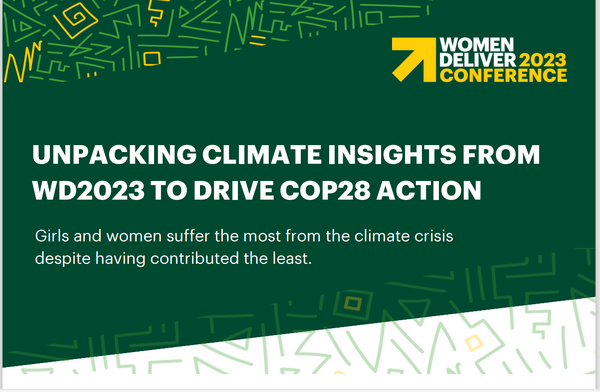
Girls and women suffer the most from the climate crisis despite having contributed the least.
"At the Women Deliver 2023 Conference (WD2023), the intersection of girls and women and the climate crisis was a cross-cutting issue recognized as one of the biggest challenges to gender equality globally. Many critical topics and calls-to-action were raised, and we have identified three main themes: 1. Bodily autonomy is a climate justice issue; 2. Girls, women, and youth are key to driving climate justice; 3. We need feminist systems change.- “Women did not know that they had rights regarding the environment and land. With the effects of climate change, women have to travel long distances to secure food, health, and education in Senegal. Women do it all and men only take the money to marry someone else. Women are in charge of the household but are particularly vulnerable."
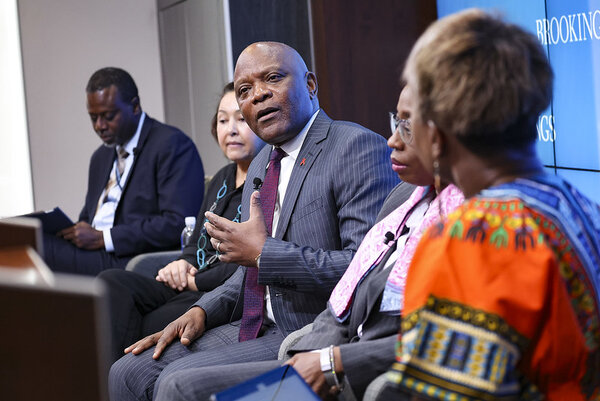
Putting the specific needs of individuals and communities at the heart of HIV/AIDS care, by harnessing behavioural science, is key to building on the progress already been made.
"(...) Botswana’s achievements stem mainly from efforts to ensure that people living with HIV — and those at greatest risk of contracting the infection — can access life-saving interventions. These include drugs that eliminate the risk of parent-to-child transmission; antiretroviral therapy, which by suppressing the virus, both protects the infected person from severe illness and death, and blocks further transmission; condoms; voluntary male circumcision; and pre-exposure prophylaxis therapy (PrEP), all of which reduce people’s chances of contracting the virus. But as infection becomes less common globally, it is becoming more challenging to reach the individuals and communities that continue to be severely affected by HIV/AIDS."
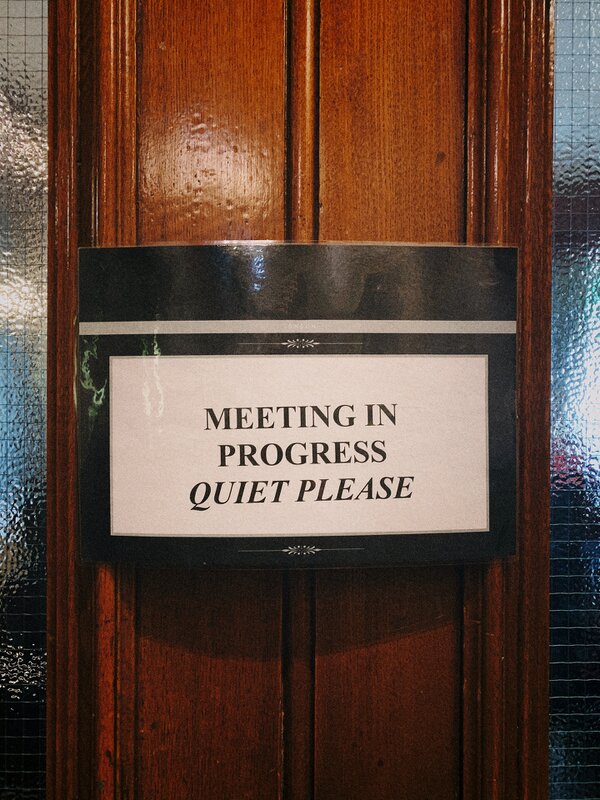
"Delegations of a group of developing countries were taken by utter surprise this week, when it became known that one of their top negotiators from the influential Africa Group, has been abruptly asked to pack up and head home in the midst of crucial negotiations in global health. This development is striking given the decisive role played by a prominent Namibian diplomat who has been known for taking strong positions on equity related provisions in on-going global health negotiations to reform the governance of health emergencies. This transpired just as Geneva is gearing up for a crucial week-long meeting where the Intergovernmental Negotiating Body on the Pandemic Agreement will meet at WHO during 4-6 December, immediately followed by the Working Group set up to amend the IHR during 7-8 December."

"This is a bumper week for pandemic negotiations – the last formal set for the year – with meetings of both the World Health Organization’s (WHO) intergovernmental negotiating body (INB) and the Working Group on Amendments to the International Health Regulations (WGIHR). (...) The International Health Regulations (IHR) define the processes leading to the declaration by the WHO Director General of a public health emergency of international concern and member states’ responsibilities. They are the only global internally binding obligations related to health emergencies."
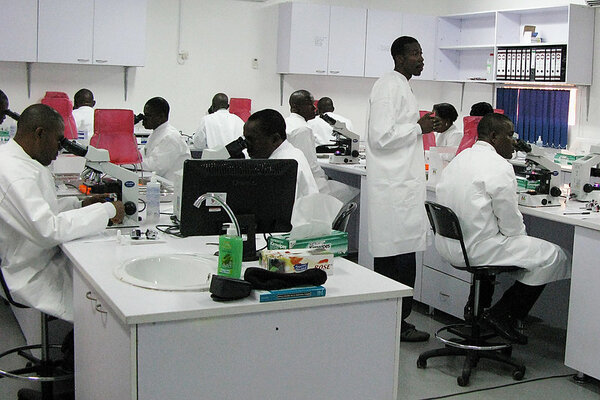
"LUSAKA, Zambia – Ensuring that Africa can manufacture its own vaccines will represent “the second independence of Africa”, Dr Jean Kaseya, Director General of the Africa Centre for Disease Control and Prevention (Africa CDC), said at the start of the Conference for Public Health in Africa 2023 (CPHIA) on Monday. “Many African countries got their independence [from colonisers] in the 1960s, but we saw in COVID that we are not independent,” Kaseya told a media briefing shortly before CPHIA’s opening. “Other continents locked their doors and we were left beyond.” With over 5,000 in-person delegates and an additional 20,000 virtual participants in attendance, Kaseya described CPHIA23 as the largest global public health event outside the annual World Health Assembly."
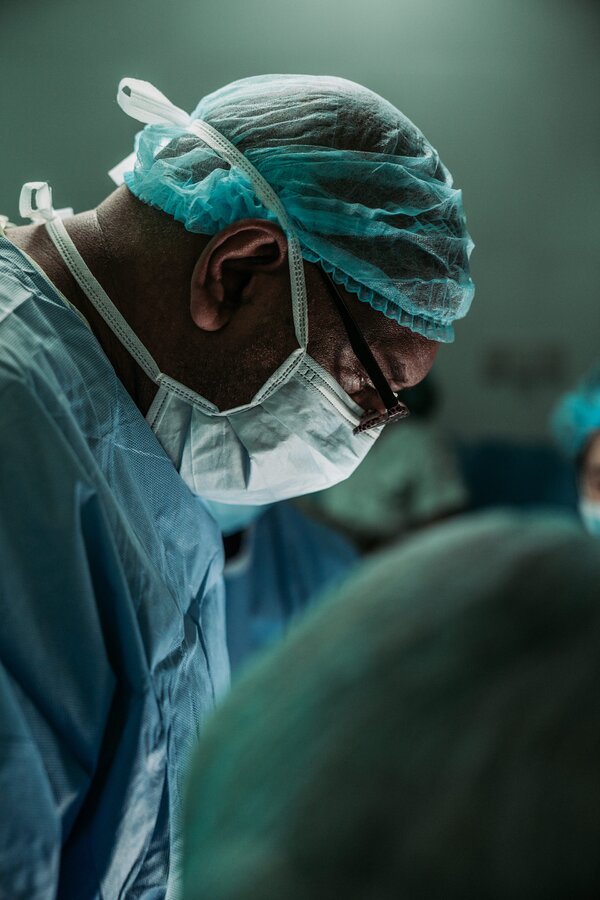
As the Global North poaches African doctors, healthcare falls to overworked and unmentored interns, some of whom learn medical procedures from YouTube.
"Fifteen of the world’s (fiscally) richest countries have over 55,000 African doctors in their health systems, a new data analysis by The Continent shows. These are doctors who qualified before entering those countries. The United Kingdom is the top culprit, followed by the United States, France, Canada, Germany and Ireland, in that order. Of the African countries being drained of doctors, an analysis of the latest data from the Organisation for Economic Cooperation and Development shows that Egypt has lost the most, followed by Nigeria, South Africa, Algeria and Sudan."

Empathische Führungspersönlichkeit für Internationale Zusammenarbeit gesucht. Bewerbungsfrist: 16. Dezember 2023
"In Ihrem Wirken für eine gesunde Welt tragen Sie zusammen mit der Geschäftsleitung die Gesamtverantwortung für die Umsetzung der Strategie und führen den Betrieb operativ. Sie stellen eine proaktive Kommunikation sicher und prägen eine konstruktive und integrierende Zusammenarbeit mit verschiedenen internen und externen Anspruchsgruppen. Sie optimieren Prozesse und Abläufe und sichern die Zukunft von SolidarMed. (...) Diese Rolle bietet Ihnen eine spannende, sinnstiftende und entwicklungsfähige Aufgabe in einem kompetenten, engagierten und internationalen Team mit flachen Hierarchien. Neben den erstklassigen Anstellungsbedingungen geniessen Sie auch eine inspirierende Arbeitsumgebung im Herzen von Luzern. Wir freuen uns auf Ihre Bewerbung bis zum 16. Dezember 2023 als PDF an bewerbung@kampahire.ch. Für weiterführende Informationen kontaktieren Sie Rosmarie Quadranti unter 079 865 66 11 oder rosmarie.quadranti@kampahire.ch .
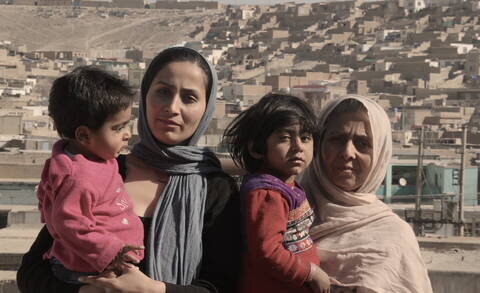
Women's Hope International "Im Rahmen der Präventionskampagne "16 Tage gegen Gewalt an Frauen" zeigen wir den Film 'A Thousand Girls like Me' der afghanischen Regisseurin Sahra Mani. Anschliessend gibt es ein Gespräch zur Situation von gewaltbetroffenen Frauen in Afghanistan. Der Dokumentarfilm "A Thousand Girls like Me" von der afghanischen Regisseurin Sahra Mani begleitet Khatera, welche jahrelang von ihrem Vater sexuell missbraucht wurde. Schwanger mit dem zweiten Kind ihres Vaters beschliesst sie, den Fall publik zu machen und den Missbrauch vor Gericht zu bringen. Dabei muss sie nicht nur gegen die patriarchale Gesellschaft und ein korruptes Rechtssystem ankämpfen, sondern auch gegen die eigene Familie und Nachbarschaft. - Der Filmevent in Basel am 8. Dezember 2023 findet in Kooperation mit IAMANEH Schweiz statt und ist Teil des Frauenstark! Filmfestivalprogramms. Beide Events werden im Rahmen der Kampagne 16 Tage gegen Gewalt an Frauen organisiert."
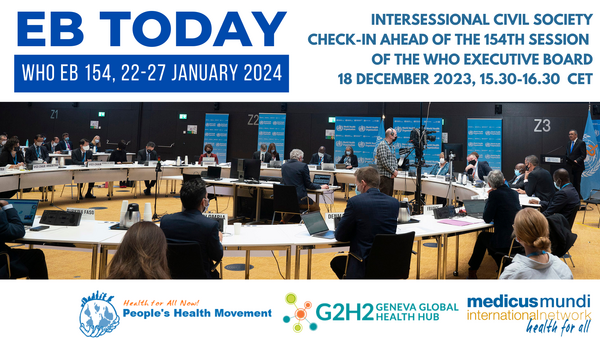
Medicus Mundi International (MMI) "The People’s Health Movement (PHM), the Medicus Mundi International Network (MMI) and the Geneva Global Health Hub (G2H2) will convene, on 18 December 2023, a first intersessional civil society check-in meeting in view of the 154th Session of the WHO Executive Board in January 2024. Join us if you like to know more (and/or share information) about access to and expected working conditions for civil society at EB154, key agenda items and resolutions expected to be adopted by the Executive Board in January, and more."
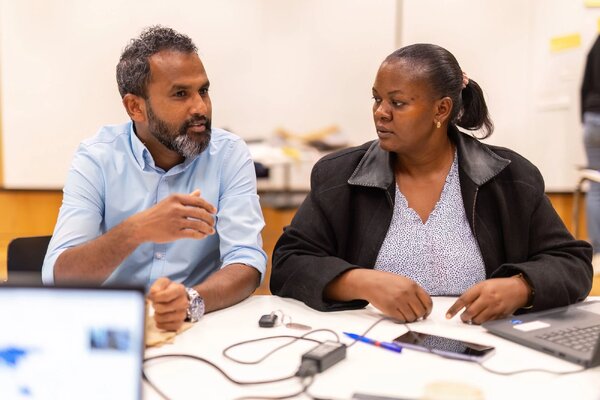
Swiss TPH Participants will learn the key concepts, terminology and methodologies used in economic evaluation in health sector settings and have the opportunity to apply these in practical exercises and assignments. The aim is to equip future managers in health care with the tools needed to interpret, commission and guide economic evaluation in their work as one of the essential elements of decision-making.
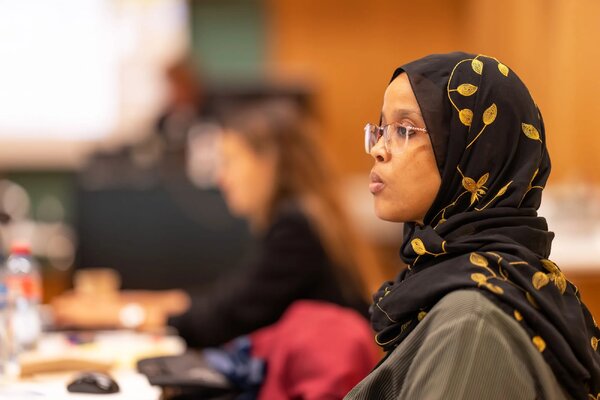
Swiss TPH “Organisations work the way human beings create them” (Peter M. Senge, 1996). In today’s fast-paced world, change is a constant and increasingly complex element of organisational management. Traditional management approaches often lack specificity and awareness for current environmental, societal and technological transformations. The future success of organisations in the 21st century, however, will depend on their response to these rapidly shifting trends. Will leaders cling to the status quo and be left behind? Or will they embrace the changing landscape and become drivers for change?

Swiss TPH "Improving access to healthcare in low- and middle-income countries (LMICs) is a global issue. On 8 February 2024, Swiss TPH brings together experts and key players from the pharmaceutical industry, academia and Product Development Partnerships to assess current strategies and progress and to foster synergies between partners for more effective product development, licensing and implementation. Join us for this multidisciplinary networking event organised in collaboration with Healhcare Dialogues."